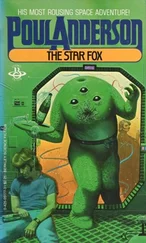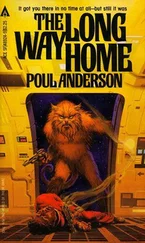Ridenour started his pipe. “Well, now, suppose you look at the matter as I do,” he suggested. “Freehold is an old human colony, although it lies far from Terra. It was founded before the Empire and stayed sovereign after the Empire began. There was just no special reason why we should acquire it, take on responsibility for it, while the people remained friendly. But needing trade and not getting many human visitors, they looked elsewhere. The Merseians had lately brought modern technology to Aruli. Arulian mercantile associations were busy in this region. They had the reputation of being industrious and reliable, and they could use Freehold’s produce. It was natural that trade should begin; it followed that numerous Arulians should come here to live; and, as you say, it was quite proper to grant them extraterritoriality.
“But.” He wagged his pipestem. “Relationships between the Terran and Merseian Empires grew more and more strained. Armed conflict became frequent in the marshes. Freehold felt threatened. By now the planet had—if not a booming industry—at least enough to make it a military asset. A tempting target for anyone. Sovereign independence looked pretty lonely, not to say fictitious. So the Nine Cities applied for membership in the Empire and were accepted—as much to forestall Merseia as for any other reason. Of course the Arulian minority objected. But they were a small minority. And in any case, as you said, compromise should have been possible. Terra respects the rights of client species. We must; they are too many for suppression. In fact, no few nonhumans have Terran citizenship.”
“Nevertheless,” the prisoner said, “you violated what we hold hallowed.”
“Let me finish,” Ridenour said. “Your mother world Aruli, its sphere of influence, everything there has lately became a Merseian puppet. No, wait, I know you’ll deny that indignantly; but think. Consider your race’s recent history. Ask yourself what pronouncements have been made by the current Bearers of the Horns—as regards Merseia versus Terra—and remember that they succeeded by revolutionary overthrow of the legitimate heirs. Never mind what abuses they claim to be correcting; only recall that they are Merseian-sponsored revolutionaries.
“Reflect how your people here, on this planet, have always considered themselves Arulians rather than Freeholders. Reflect how they have, in fact, as tensions increased, supported the interests of Aruli rather than Terra. Maybe this would not have occurred, had the humans here treated you more fairly in the past. But we were confronted with your present hostility. What would you expect us to do—what would you do in our place—but decree some security regulations? Which is the prerogative of His Majesty’s government, you know. The original treaty granting them extraterritoriality was signed by the Nine Cities, not by the Terran Empire.
“So you revolted, you resident aliens. And we discovered to our dismay that the rebellion was well prepared. Multiple tons of war supplies, multiple thousands of troops, had been smuggled beforehand into wilderness areas… from Aruli!”
“That is not true,” the prisoner said. “Of course our mother world favors our righteous cause, but—”
“But we have census figures, remember. The registered Arulian-descended Freeholders do not add up to anything like the total in your ‘Sacred Horde.’ You yourself, my friend, whose ancestors supposedly lived here for generations, cannot speak the language! Oh, I understand Aruli’s desire to avoid an open clash with Terra, and Terra’s willingness to indulge this desire. But let us not waste our personal time with transparent hypocrisies, you and I.”
The prisoner refused response.
Ridenour sighed. “Your sacrifices, what victories you have had, everything you have done is for nothing,” he went on. “Suppose you did succeed. Suppose you actually did win your ‘independent world in pheromone association with the Holy Ancestral Soil’—do you really think your species would benefit? No, no. The result would mean nothing more than a new weapon for Merseia to use against Terra… a rather cheaply acquired one.” His smile was weary. “We’re familiar with the process, we humans. We’ve employed it against each other often enough in our past.”
“As you like,” the Arulian said. By instinct he was less combative as an individual than a human is, though possibly more so in a collectivity. “Your opinions make scant difference. The great objective will be achieved before long.”
Ridenour regarded him with pity. “Have your superiors really kept on telling you that?”
“Surely. What else?”
“Don’t you understand the situation? The Empire is putting less effort into the campaign than it might, true. This is a distant frontier, however critical. Two hundred light-years make a long way from Terra. But our lack of energy doesn’t matter in the long run, except to poor tormented Freehold.
“Because this system has in fact been taken by us. You aren’t getting any more supplies from outside. You can’t. Small fast courier boats might hope to run our blockade, I suppose, if they aren’t too many and accept a high percentage of loss. But nothing except a full-sized task force would break it. Aruli cannot help you further. She hasn’t that kind of fleet. Merseia isn’t going to. The game isn’t worth the candle to her. You are cut off. We’ll grind you away to nothing if we must; but we hope you’ll see reason, give up and depart.
“Think. You call it yaro fever, do you not—that disease which afflicts your species but not ours—for which the antibiotic must be grown on Aruli itself where the soil bacteria are right? We capture more and more of you who suffer from yaro. When did you last see a fresh lot of antibiotic?”
The prisoner screamed. He cast his cigar at Ridenour’s feet, sprang from his chair and ran to the office door. “Take me back to the stockade!” he wept.
Ridenour’s mouth twisted. Oh, well, he thought, I didn’t really hope to learn anything new from any of those pathetic devils.
Besides, the savages are what I’m supposed to investigate. Though I’ve speculated if perhaps, in the two centuries they lived here, the Arulians had some influence on the outback people. Everybody knows they traded with them to some extent. Did ideas pass, as well as goods?
For certainly the savages have become troublesome.
The next day Ridenour was lucky and got a direct lead. The mayor of Domkirk arrived in Nordyke on official business. And word was that the Domkirk militia had taken prisoners after beating off a raid from the wilderness dwellers. Ridenour waited two days before he got to see the mayor; but that was about par for the course in a project like this, and he found things to do meanwhile.
Rikard Uriason proved to be a short, elegantly clad, fussy man. He was obviously self-conscious about coming from the smallest recognized community on the planet. He mentioned a visit he had once made to Terra and the fact that his daughter was studying on Ansa, twice in the first ten minutes after Ridenour entered his hotel room. He kept, trying to talk the Emperor’s Anglic and slipping back into Freeholder dialect. He fussed about, falling between the stools of being a gracious host and a man of the universe. Withal, he was competent and well informed where his own job was concerned.
“Yes, sir, we of Domkirk live closer to the outback than anyone else. For various reasons,” he said, after they were finally seated with drinks in their hands. A window stood open to the breeze off Catwick—always slightly alien-scented, a hint of the smell that wet iron has on Terra—and the noise of streets and freight-belts, and the view of waters glittering out to the dunes of Longenhook. “Our municipality does not yet have the manpower to keep a radius of more than about two hundred kilometers under cultivation. Remember, Terran crops are fragile on this planet. We can mutate and breed selectively as much as we like. The native life forms will nonetheless remain hardier, eh? And, while robotic machines do most of the physical work, the requirement for supervision, decision-making human personnel is inevitably greater than on a more predictable world. This limits our range. Then too, we are on a coastal plateau. Onyx Heights falls steeply to the ocean, westward to the Windhook, into marsh—unreclaimable—by us at our present stage of development, at any rate.”
Читать дальше











